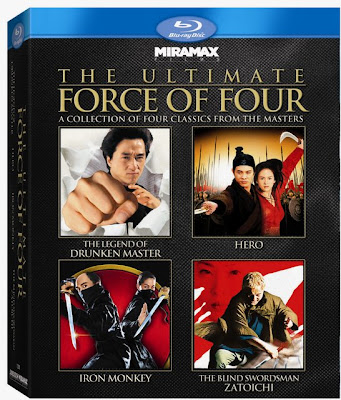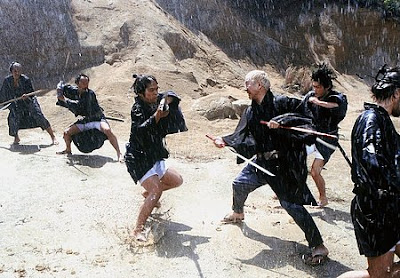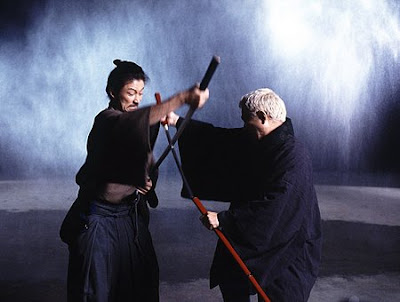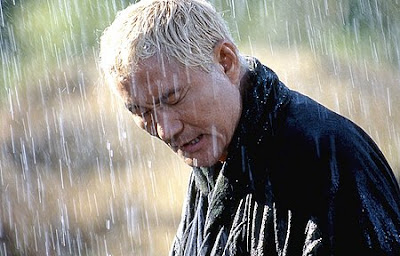Part of the New Blu-ray Set
Bookmark this on Delicious
Print Page
AKA Zatoichi: The Blind Swordsman
It takes a certain kind of filmmaker to remain undaunted by the fact that the main character of the film they're pouring their heart and soul into has already appeared in over two dozen cinematic and televised installments in Japan's phenomenally successful Zatoichi series. Luckily, Takeshi Kitano is exactly the right filmmaker for such a task.
Instead of staying completely faithful in both his portrayal and adaptation of the blind hero who poses as a masseur by day, gambles by night and slices villains with his cane/sword whenever they stand in his path, writer/director/actor and editor Takeshi Kitano engaged in a cinematic free-for-all.
The two main ingredients for the highly potent yet admittedly dizzying work consist of Kitano's ingenious blend of his countryman Akira Kurosawa's Yojimbo and the 1960s Spaghetti Westerns it inspired (when Zatoichi fever was at a major high with the debut film's launch in '62) as filtered with the natural musicality evidenced in the fine-tuned precision of martial arts choreography.
I must grant that it does suffer from Guy Ritchie style overload at the beginning in switching too rapidly from one character's situation to the next and barely giving us time to register who our main ensemble will be aside from Zatoichi. And to this end, I'm still baffled as to the identity of a rival gang that was discussed throughout yet Kitano's wildly original oddity moves from exploitative gore fest to operatic homage.
Obviously Zatoichi--played by Kitano with a bizarre choice of shockingly bright dyed white blonde hair-- is our film's heroic anchor as a man whose other four senses have been augmented to the point where he can defeat sighted foes by the dozens in blink-and-you-missed-it slice and dice encounters. Yet, his plight in the film coincides with the emotional, revenge driven quest of two siblings-- one male (in drag) and one female-- who've been masquerading as geisha for the past decade while trying to exact murderous vengeance on the powerful gang who'd massacred their entire family.
Meanwhile, in a thematic overlap about family honor and struggling against debilitating conditions, a wandering Ronin warrior in need of a master accepts a job working as a bodyguard for the community's most notorious gang leader in the hopes of raising enough money to pay for the medical treatment that could save his wife's life.
While it's as confusing as it sounds, Kitano balances the tone very well by segueing easily from pathos to wit throughout the work beginning with the movie's tongue in cheek opener that sets up the stage for the blood that will follow as well as its offbeat humor as men whip out swords too quickly when too close together and accidentally axe someone standing next to them in the process. Moreover, Zatoichi seems to find himself overly amusing as he giggles like a schoolgirl in a way that's indicative of the feel of the Blake Edwards series of Pink Panther movies starring Peter Sellers as Inspector Clouseau (which also kicked off in the '60s).
With an exuberant style, Zatoichi dazzles as a work overall as the entire post-production process turned what could've been a standard samurai picture into a bold, ambient, lyric-free musical masquerading as a not quite as Sweeney Todd like blood bath from which even Baz Luhrmann and Rob Marshall could learn. An expert and daring cutter, Kitano's a hell of an editor and he strengthens the film his cinematographer has captured by tweaking every aspect from workers in a field to the use of weather just so that it becomes a veritable musical number that's intense as any choreographed Fosse influenced production on stage.
Yet somehow and most likely because of some of the more subtle touches laced throughout, the cinematically self-conscious Zatoichi is still not as over-the-top as some of Kitano's Asian contemporary works including Kung Fu Hustle or this year's Bollywood Kung Fu picture Chandni Chowk to China no matter how far he reaches as the film culminates in a Bollywood meets Riverdance (Slumdog Millionaire style) performance as the characters engage in a modern tap dance number.
Moreover, even when the film loses us temporarily due to either confusing presentation or a bizarre technique, Zatoichi stands out more than Hustle or Chandni because our sensitive filmmaker is unafraid to reach for genuine heartrending emotion and treats his characters with dignity instead of as simply punchlines. He does this repeatedly by exploring serious subplots including the M. Butterfly laced Dickensian hybrid of the devastating past of the two kids who stuck together, willing to exploit themselves to survive until they can try to pick up the broken pieces of their interrupted and horrific lives.
Yet while the film is all over the place and its ambition is its downfall at times as again I wasn't quite able to follow him from character A to character B for awhile, I commended his confidence as a filmmaker to trust his audience enough to pour so many genres, anachronisms, and tones into one production. Inventive, dynamic, and unlike anything else in contemporary Japanese cinema-- Zatoichi is even more beautiful on Blu-ray with the enhanced sound of rain and shoes that blend musically into the soundtrack and a flawless visual transfer that relishes as equally in the blood as it does in the scenery and period costuming.
The sole Japanese offering in Buena Vista Home Enterainment's dynamite Ultimate Force of Four Blu-ray box set, Kitano's lauded work earned audience awards at both the Venice and Toronto International Film Festival in the year of its release which was no doubt bolstered by the debut of Quentin Tarantino's Kung Fu rule breaker Kill Bill Vols. 1 & 2.
Zatoichi
Takeshi Kitano
Takeshi Kitano
Text ©2009, Film Intuition, LLC; All Rights Reserved. http://www.filmintuition.com
Unauthorized Reproduction or Publication Elsewhere is Strictly Prohibited.




















